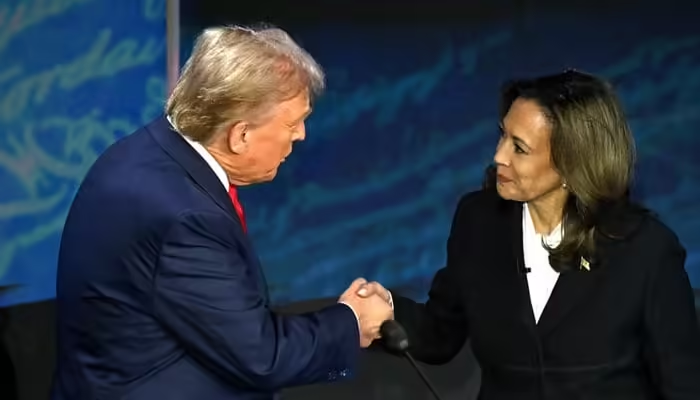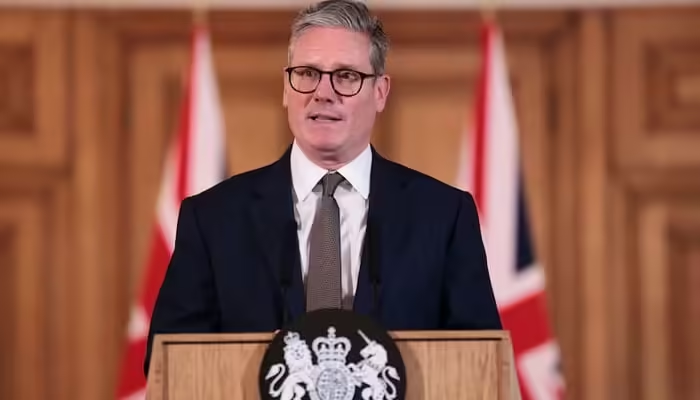In a bold and unprecedented move, the Arab American Political Action Committee (AAPAC) has announced that the Arab and Muslim communities residing in the United States will not support any of the Democratic or Republican candidates in the upcoming 2024 U.S. Presidential Elections. This decision stems from the U.S. government’s continued support of Israel amid the ongoing conflict in Palestine and Lebanon, a stance that has led to growing frustration and disillusionment within the Arab American community.
A Shift from Tradition
Historically, Arab and Muslim Americans have largely supported Democratic candidates in U.S. elections. This support was especially visible in the 2020 presidential race, when the majority of the Arab American community backed Democratic candidate Joe Biden. However, the continued U.S. military and financial aid to Israel, combined with its tacit approval of Israel’s actions in the occupied Palestinian territories, has led to a significant shift in the community’s political alignment.
The AAPAC’s recent decision signals a break from tradition, as the community, feeling betrayed by both major political parties, has decided to withhold its support from all presidential candidates, including the top contenders—Donald Trump from the Republican Party and Kamala Harris from the Democratic Party.
The Role of U.S. Aid to Israel
One of the primary reasons behind this boycott is the U.S. government’s unwavering financial and military support for Israel. Since the start of the Gaza war, the U.S. has provided Israel with a staggering $17 billion in military aid. This funding has helped fuel Israel’s aggressive military operations, resulting in devastating consequences for Palestinians. According to reports, more than 43,000 Palestinians have been killed, and over 100,000 injured since the outbreak of violence on October 7, 2023.
The Arab American community views this support as a direct endorsement of Israel’s military actions, which include widespread airstrikes and ground invasions targeting civilians in Gaza. The human toll of this conflict has outraged many, leading them to question the moral and ethical stance of both the U.S. government and the political parties supporting such policies.
Breaking Point: Israeli Aggression in Palestine and Lebanon
The situation in Gaza and Lebanon has been at the forefront of Arab American concerns. The escalating violence, destruction of homes, hospitals, and schools, and the humanitarian crisis that has ensued in Gaza have left many Arab and Muslim Americans in deep distress.

While there have been calls for a ceasefire and peace talks, both the Democratic and Republican parties have largely avoided taking strong actions to pressure Israel into de-escalation. President Joe Biden’s administration has defended Israel’s right to “self-defense” in the face of Hamas, while also sending substantial aid packages to support Israel’s military efforts.
Arab Americans, who closely follow developments in the Middle East, have expressed profound dissatisfaction with the lack of meaningful U.S. engagement in protecting Palestinian lives. As a result, they feel that their voices and concerns are being ignored by the political establishment, leading them to boycott the election entirely.
A Fractured Relationship with the Democratic Party
The Arab and Muslim community’s traditional loyalty to the Democratic Party has been significantly tested in recent years. Many Arab Americans were hopeful that the Biden administration would take a more balanced approach to the Israel-Palestine conflict after the controversial tenure of Donald Trump, who recognized Jerusalem as the capital of Israel, moved the U.S. Embassy there, and helped broker normalization deals between Israel and several Arab nations without addressing the Palestinian issue.
However, Biden’s administration has largely maintained the status quo, continuing to provide billions of dollars in aid to Israel while failing to hold it accountable for alleged human rights violations against Palestinians. This has left Arab Americans feeling betrayed by the very party they once supported.
The decision to boycott the election also reflects growing frustration with Kamala Harris, the Democratic candidate for the 2024 election. Many feel that her position on the Israel-Palestine issue is not substantially different from Biden’s, offering little hope for a change in U.S. foreign policy toward the region.
A Voice for Change?
The decision of the Arab American community to withhold their vote is seen as a powerful statement against the U.S. government’s complicity in the violence against Palestinians. It is also a call for greater accountability and more ethical foreign policy decisions, not just in relation to Israel and Palestine but also concerning broader issues affecting the Arab world.
In the past, Arab Americans have tried to influence U.S. foreign policy through their support of Democratic candidates, hoping that their votes would lead to more balanced diplomacy. However, the lack of meaningful change has pushed the community toward more drastic measures, such as boycotting the election.
Many Arab American leaders believe that this boycott is a way to assert their political power, highlighting the significant size of the Arab and Muslim population in the U.S. and the potential influence they wield. By refusing to vote for either of the two major parties, the community hopes to send a clear message that their support cannot be taken for granted while their concerns are ignored.
Looking Ahead: A Political Awakening
While the Arab American community’s decision not to participate in the 2024 elections may reduce their immediate influence in the political arena, it also represents a political awakening. Many within the community are calling for the creation of new political platforms that prioritize the interests of Arab and Muslim Americans and advocate for just and humane foreign policies.
The upcoming presidential election is shaping up to be a critical moment for Arab Americans, as they seek to redefine their political engagement in the U.S. Will their boycott lead to a shift in how future candidates approach Middle East policy, or will it further alienate them from the American political system?
Only time will tell, but one thing is certain: the Arab American community’s decision to boycott the 2024 U.S. Presidential Election has sparked an important conversation about political accountability, the Israel-Palestine conflict, and the role of minority communities in shaping U.S. foreign policy.



